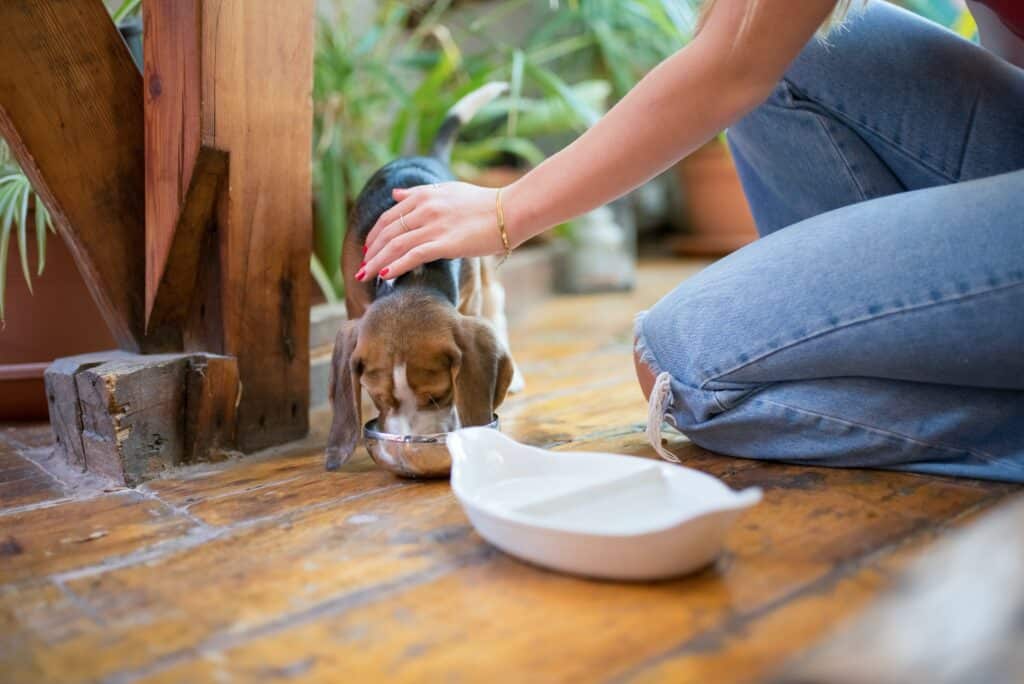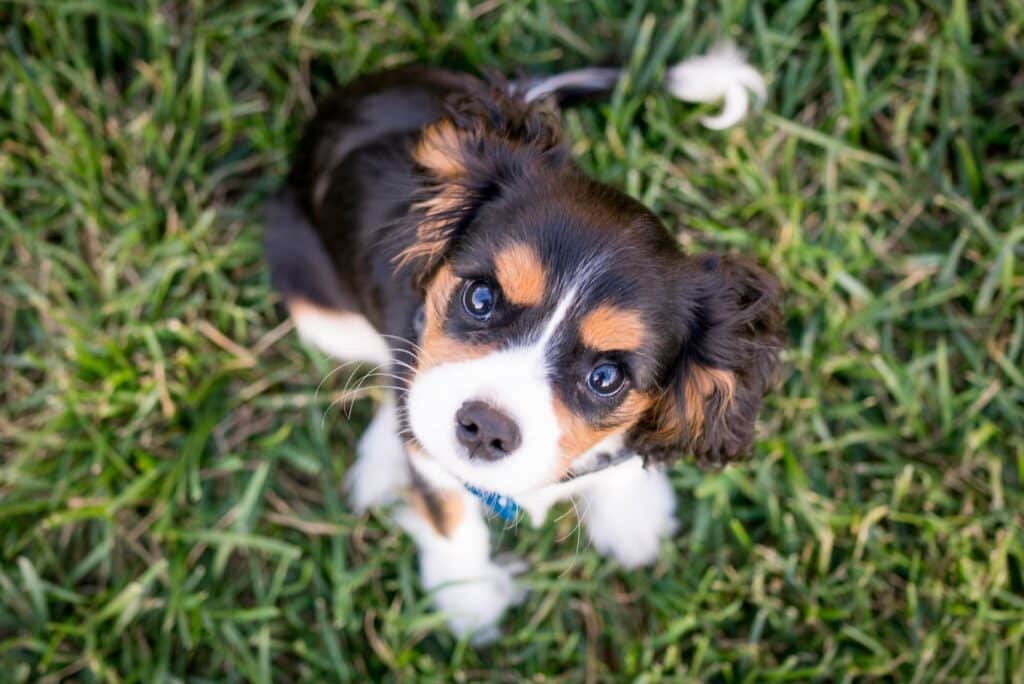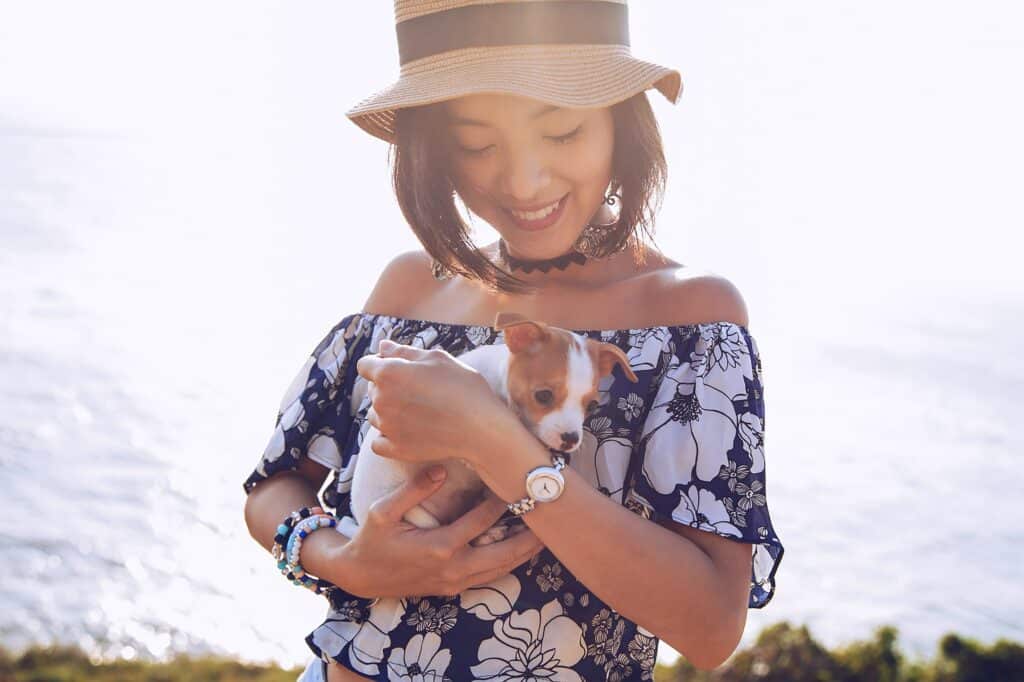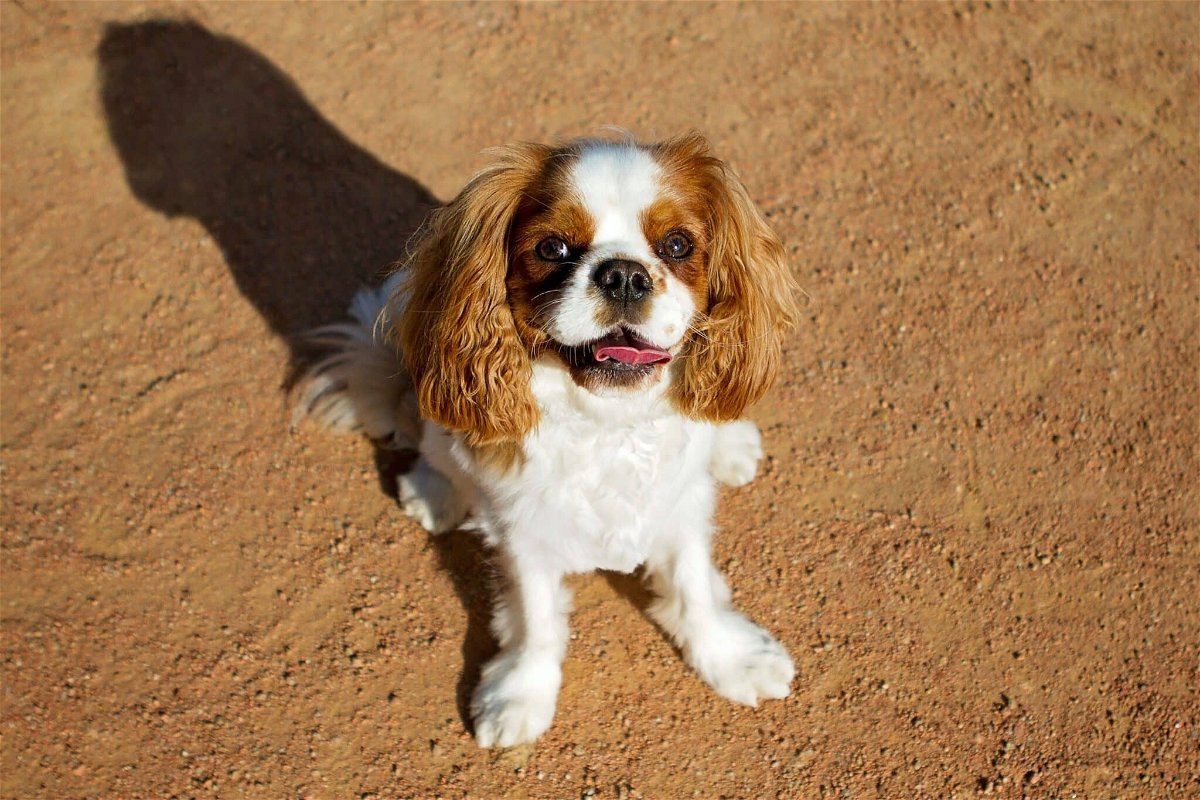We're an affiliate
We hope you love the products we recommend! Just so you know, we may collect a share of sales or other compensation from the links on this page at no additional cost to you. Thank you if you use our links, we really appreciate it!
Just like humans and other mammals, dogs too can get hiccups and there is nothing wrong with it.
But sometimes it can be disturbing and worrying to see your lovely puppy experiencing non-stop and forceful hiccupping.
Whether you just started your pet parenting journey or you’re a seasoned pet owner, there is a point where your puppy’s hiccups should be of concern to you.
In this post, we are going to dissect everything you should know about puppy hiccups. We will kick off by discussing their causes and narrowing down on how to get rid of puppy hiccups.
Keep reading to find out our answers to the most frequently asked questions on this topic.
Can Dogs Get Hiccups?
Yes, dogs can definitely get hiccups. The mechanism that induces hiccups in dogs can be comparable to that of other mammals.
Dogs will experience hiccups due to the involuntary rapid contraction (spasm) of the diaphragm; which is the muscle that separates the chest cavity from the abdomen in all mammals.
This is the organ that is largely responsible for respiration in mammals.
During inhalation, the diaphragm contracts and moves downward. This action increases the volume in the chest cavity and helps in pulling air into the lungs.
During exhalation, the diaphragm muscles relax to reduce the volume of the chest cavity hence pushing out air from the lungs.

This movement of the diaphragm is usually smooth and regular until it suddenly spasms.
The involuntary contraction causes the glottis (the opening between the vocal cords in the dog’s larynx) to suddenly close and causes the ‘hic’ sound.
Hiccups in dogs are often a temporary and harmless inconvenience that should not cause a major concern.
They usually subside on their own but if your dog is experiencing hiccups for an extended period, it could be a sign of an underlying condition. The most common medical conditions may include acid reflux or gastrointestinal problems.
Why Do Puppies Get Hiccups?
It is not yet clear to scientists why dogs and other mammals get hiccups. One theory postulated that hiccupping is a vestige action from the fetus’s development in the womb.
Some researchers have in actual fact seen and documented fetal hiccups in various mammalian species but they were concluded to be respiration tests.
Is It Normal for Puppies to Have Hiccups?
Puppies can experience mild hiccups every day, and as long as they are not accompanied by other signs, then it is completely normal.
Younger dogs are more prone to get hiccups than adult dogs because they have weak muscles and organs which are still developing.
There are various reasons why your puppy could experience hiccups. Here are some of them:
1. Eating or drinking quickly
When puppies eat or drink too fast, they swallow large chunks of food and also gulp down too much air in the process.
This trapped air disrupts breathing and also causes the diaphragm to contract unexpectedly hence causing hiccups.

Teaching and encouraging your puppy to feed at a slower pace will reduce the possibility of experiencing hiccups due to eating/drinking.
If you feel like your puppy drank too much water before bedtime, don’t shy off from waking them to pee at night for their potty break.
2. Excitement or stress
Emotional conditions such as excitement and stress in puppies can cause physical indicators in the form of hiccupping. This is because they interfere with the breathing pattern.
When a puppy alters their emotional condition, their breathing will either become rapid or shallow which can cause the trapping of air in the diaphragm. This can eventually cause hiccups which come from involuntary contractions.
Too much excitement also causes the puppy’s muscles, including the diaphragm to become uptight. This tension can cause the diaphragm to contract unexpectedly hence leading to hiccups.
When puppies are stressed or overly excited, their heart rates and cortisol (a steroid hormone) levels will increase. This upsurge can irritate the diaphragm and this might induce hiccupping.
Hiccups caused by excitement and stress are usually not harmful and so you should not be worried about this temporary condition.
3. Stomach gas
Sometimes, puppies can experience hiccups as a way of expelling excess gas from their stomach. This hiccupping is positive because it reduces the chances of bloating which could otherwise become undesirable.
4. Medication
Certain medicines such as benzos, corticosteroids, and antibiotics can cause your puppy to experience hiccup responses.
These medications are known to have side effects that can irritate the puppy’s gullet and this could lead to acid reflux.
Opioids such as morphine are known to suppress the breathing pattern if taken in excess. This could lead to air traps in the lungs hence inducing your puppy to hiccup.
A golden retriever was shown to have a hiccup-like response after being numbed with isoflurane; a general anesthesia.
Make sure to get all the side effects from your vet before starting your dog on a particular medication and stick to the recommended dosage for your pup.
Should I Be Worried If My Puppy Has Hiccups?
In most cases, you should not be worried about your puppy experiencing hiccups especially when they last for a few minutes.
Mild hiccups are harmless and they do not raise concerns for medical attention. But if your puppy gets hiccups a lot, then there is a reason to be worried.

Prolonged hiccuping can cause irregular and labored breathing and this could turn out to be dangerous if not checked in good time.
Violent hiccups can be a sign of other underlying medical conditions such as:
- Acid reflux
- Respiratory diseases
- Pneumonia
- Upset stomach
- Ingestion of foreign matter
- Heatstroke
How to Get Rid of Puppy Hiccups
The good thing about puppy hiccups is that they are harmless and will typically settle down on their own.
But if the situation seems harsh for your little pooch, or they’re vomiting, you may need to do something to help them out.
Since humans and dogs experience hiccupping, you may have heard of the things you can do to reduce hiccups in humans.
Home remedies such as drinking some water, holding your breath, pulling out the tongue, or rubbing the back are believed to calm down hiccups in humans.
It is good to remind you that none of these therapies has been proven to work in humans. If you try some of them, you might end up scaring your puppy.
Here are some of the things you can do to help settle your puppy’s hiccups:
1. Drinking water
A few sips of clean drinking water will work to reduce hiccups in humans and puppies alike. Just make sure you allow them to drink it calmly and slowly.
If your little pooch is not in the mood of taking in some water, you can try adding some honey or maple syrup to satisfy their taste buds. You can also give them one or two ice cubes to stimulate their nerves.
2. Adjust the diet
Some foods are most likely to induce your puppy to have hiccups. A diet that is full of grains such as wheat will make them experience this side effect.
You can change your puppy’s diet to ensure they get all the nutrients and minerals while experiencing minimal side effects.
Don’t give your puppy solid food when they’re experiencing violent hiccups. This could easily choke them and make the situation worse.
3. Slow down their eating speed
Quick feeding is one of the reasons why your puppy might be induced to hiccups. You can regulate your dog’s food intake by using an elevated dog bowl and giving them small portions at a time in frequent sessions.
The raised feeder will provide the right posture during feeding and hence help to slow down the eating speed.
Eating slowly also helps to improve your puppy’s gastrointestinal health and reduce the chances of bloating.
4. Provide light exercises
Take your puppy for a brief walk around your yard or play a simple game like fetch with them. This will change their breathing intervals and adjust their heart rate. Make sure to engage in activities that they seem comfortable with.
5. Calm down your puppy
Hiccups caused by emotional changes can be reduced by calming down your young dog. Give them a gentle tummy rub while admiring their fur to make them feel secure and comfortable in your presence.
Rubbing the belly area will also help to restore the breathing pattern to make them more rhythmic and this helps to reduce hiccups.
During this moment, you can gently massage your puppy’s chest to help cancel out the rapid contractions along the diaphragm and restore their breathing rhythm.
Prevention And When to See a Vet
There is no one sure way of completely preventing your puppy from experiencing hiccups. Play your part by ensuring they have good eating habits and instill regular breathing patterns even when exercising.
You should therefore relax and try to identify what induced your young pooch to hiccups. Never give them unprescribed medicine in an attempt to relieve them from hiccupping.

If your puppy is experiencing frequent hiccups for extended periods, typically more than 30 minutes, we recommend that you visit your vet immediately.
The following are some of the signs that indicate your puppy requires medical attention:
- Prolonged hiccups with coughing and vomiting
- The puppy seems to be uncomfortable while hiccupping
- Excessive drooling
- Wheezing after hiccupping
- Difficulty in breathing
Make sure to give your vet a good explanation of the hiccupping. You can use your camera/smartphone to record your puppy as they experience hiccupping.
This will give the vet a clear picture of what they are experiencing and provide a baseline on how to assess your furry friend.
Frequently Asked Questions (FAQs)
1. Why do puppies get hiccups after eating?
Puppies are prone to get hiccups after eating due to overeating or the possibility of swallowing too much air while eating quickly.
The trapped air in the stomach will irritate the diaphragmatic muscles and cause them to rapidly contract hence causing hiccups.
2. Are hiccups painful for puppies?
We can only tell if hiccups are painful to puppies by observing how they react while experiencing them. For the most part, we have noted that the experience is not painful for puppies.
They could only get annoyed in making the ‘hic’ sound for an extended period but the muscle contractions don’t take a toll on their bodies.
Severe hiccups could hurt your dog when they’re accompanied by other signs such as throwing up and coughing.
3. How long should dog hiccups last?
In normal cases, dog and puppy hiccups should last for a few minutes before disappearing on their own.
A range of between 10 and 20 minutes is still widely considered to be normal. This should not raise concerns for medical attention.
If your dog is continuously hiccupping for more than 30 minutes, their case might be severe.
We recommend that you look out for other warning signs that could indicate an underlying medical condition and visit the vet immediately.
4. My dog keeps hiccupping and swallowing, what should I do?
This could be a sign of an underlying problem in their stomach/digestive system or a respiratory condition.
You should speak to your vet if you notice any sign of agitation with violent hiccups from your dog.
Your vet will do various diagnostic tests to rule out any medical conditions and prescribe the appropriate treatment if they’re found to be sick.
For the time being, you can give your dog some sips of clean drinking water to see if that will unsettle the hiccup cycle. You can also induce them to vomit and see if there is a toxin in their stomach.
Make sure to tell your vet all the natural remedies you tried on your pup during your visit.
To Wrap up
How to get rid of puppy hiccups may seem like a complicated task, but it’s important to remember that violent hiccups could be an indicator of something serious.
Go ahead and try out some of our outlined remedies to help you in calming the situation. Make sure to exercise patience and take the opportunity to massage your puppy to make them relaxed.
If your young lad is experiencing severe hiccups which are accompanied by other symptoms such as difficulty in breathing, you should immediately seek your vet’s help.
Laura is the founder of Furs'n'Paws. She is a also a pet writer and expert with more than 20 years of experience of working with dogs and cats. She developed a very strong love for animals at a young age. Her passion led her to establish a thriving pet sitting and dog walking business in Dubai. As an expert in pet training, behavior, and nutrition, Laura is committed to helping pet owners and pet lovers by offering high-quality information on a wide range of topics.



No responses yet